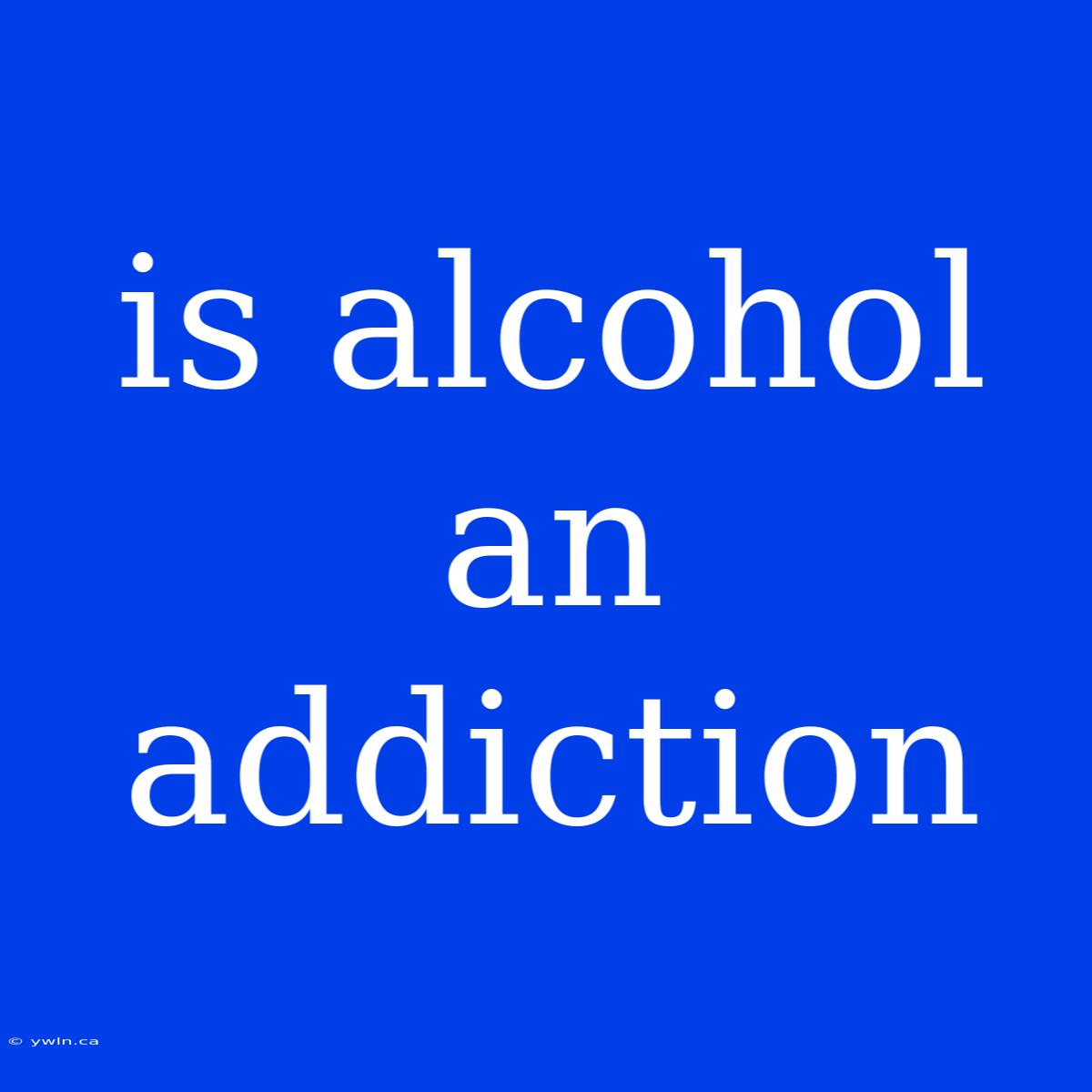Is Alcohol an Addiction? Unveiling the Complexities of Alcohol Use Disorder
Is alcohol an addiction? This question is more nuanced than a simple yes or no. While alcohol can be enjoyed responsibly by many, for some, it can spiral into a serious, life-altering condition known as Alcohol Use Disorder (AUD), commonly referred to as alcoholism.
Editor Note: Alcohol addiction, a pervasive issue, deserves attention. Understanding the signs, causes, and effects of AUD is crucial for individuals, families, and communities to address this complex health concern. This article explores the various facets of AUD, providing insights into its nature and impact.
Analysis: Our research delves into the diagnostic criteria for AUD, explores the physiological and psychological underpinnings of alcohol dependence, and examines the social and economic consequences of this disorder. We also analyze the effectiveness of various treatment approaches, providing a comprehensive overview of this intricate topic.
Key Takeaways:
| Aspect | Description |
|---|---|
| Definition | AUD is a chronic brain disease characterized by an inability to control alcohol consumption despite negative consequences. |
| Diagnosis | The Diagnostic and Statistical Manual of Mental Disorders (DSM-5) outlines specific criteria for diagnosing AUD. |
| Treatment | Options include behavioral therapy, medication, and support groups, tailored to individual needs. |
Alcohol Use Disorder
Alcohol use disorder is a brain disease that is characterized by an inability to control alcohol consumption despite negative consequences. This means that even though individuals with AUD may be aware of the harms alcohol is causing, they find it difficult, if not impossible, to stop or reduce their drinking.
Key Aspects of AUD:
- Craving: A strong desire or urge to drink, even in situations where drinking is not appropriate or harmful.
- Withdrawal: Experiencing unpleasant physical and mental symptoms when alcohol consumption is reduced or stopped.
- Tolerance: Needing more alcohol to achieve the same effect over time.
- Loss of Control: Difficulty stopping or limiting drinking once initiated.
- Negative Consequences: Despite experiencing problems caused by alcohol use, individuals with AUD may continue to drink.
The Science Behind Alcohol Addiction
Alcohol impacts the brain's reward system, leading to the release of dopamine, a neurotransmitter associated with pleasure and motivation. Continued alcohol use can alter the brain's structure and function, making it difficult to resist cravings and maintain control over drinking. This disruption in brain chemistry contributes to the compulsive nature of AUD.
Impact of AUD:
- Physical Health: Chronic alcohol use can lead to a range of health problems, including liver disease, heart disease, stroke, cancer, and digestive issues.
- Mental Health: AUD can co-occur with other mental health conditions, such as depression, anxiety, and bipolar disorder, further complicating treatment.
- Social and Family Life: Alcoholism can strain relationships, damage careers, and lead to legal and financial problems.
Treating Alcohol Use Disorder
Treatment for AUD aims to reduce alcohol consumption, manage withdrawal symptoms, and help individuals develop coping mechanisms for dealing with cravings and triggers.
Types of Treatment:
- Behavioral Therapies: Cognitive-behavioral therapy (CBT), motivational interviewing, and support groups can help individuals identify and change unhealthy behaviors.
- Medications: Medications such as naltrexone, acamprosate, and disulfiram can reduce cravings and help with relapse prevention.
- Support Groups: Alcoholics Anonymous (AA) and other support groups offer a safe and supportive environment for individuals to share their experiences and learn from others.
FAQ:
Q: What are the signs of alcohol addiction?
A: Signs can include:
- Craving alcohol
- Drinking more than intended
- Inability to stop drinking
- Tolerance to alcohol
- Withdrawal symptoms
- Neglecting responsibilities
- Legal or social problems
Q: Can someone recover from alcohol addiction?
A: Yes, recovery is possible with proper treatment and support.
Q: How do I know if someone I know has alcohol addiction?
A: Observe changes in behavior, such as increased drinking, mood swings, withdrawal, or neglect of responsibilities.
Q: What is the best way to help someone with alcohol addiction?
**A: ** Encourage them to seek professional help and offer support by providing resources and information.
Tips for Preventing Alcohol Addiction:
- Drink in moderation.
- Be aware of your limits.
- Avoid drinking in situations that increase your risk of overconsumption.
- Don't drink if you are pregnant or breastfeeding.
- Seek help if you feel you are developing an unhealthy relationship with alcohol.
Summary:
Alcohol use disorder is a serious brain disease that can have devastating consequences for individuals and their families. Understanding the nature and causes of AUD, as well as the available treatment options, is essential for promoting recovery and preventing further harm.
Closing Message:
If you or someone you know is struggling with alcohol addiction, remember that help is available. Don't hesitate to seek professional assistance and support. Recovery is possible.

